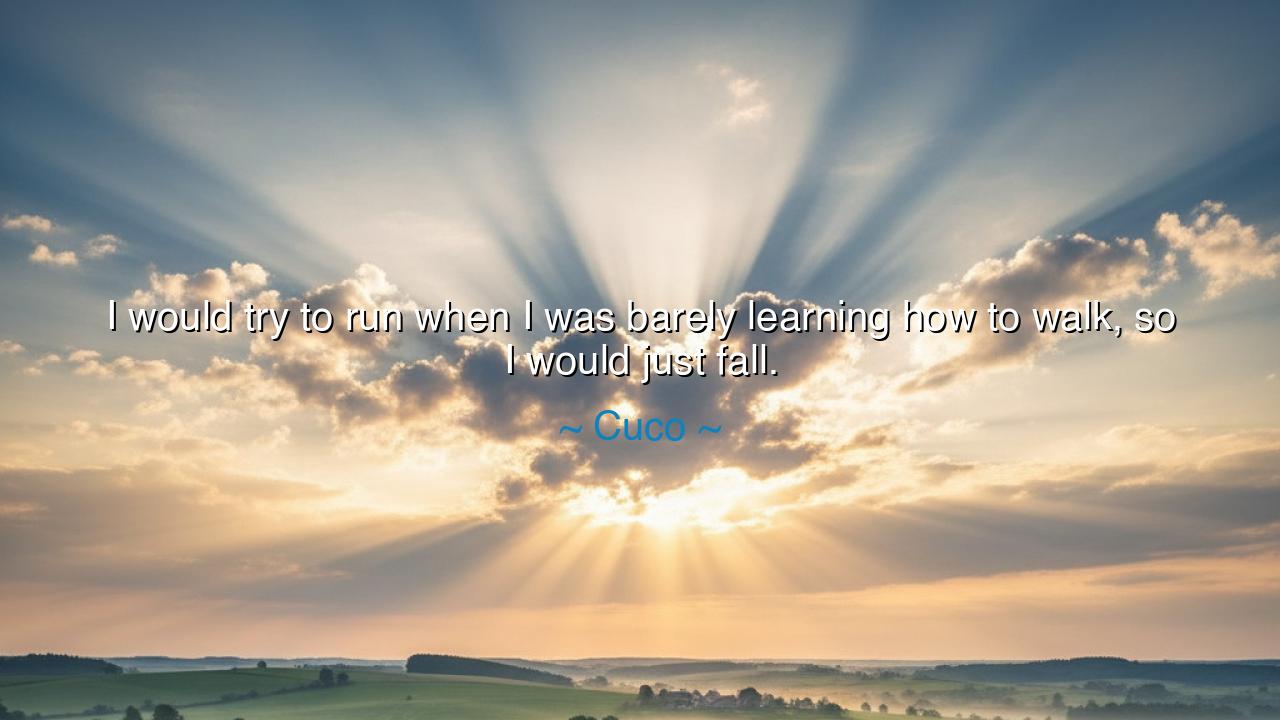
I would try to run when I was barely learning how to walk, so I






“I would try to run when I was barely learning how to walk, so I would just fall.” — Cuco
In this tender and self-aware reflection, the artist Cuco captures one of the oldest truths of the human experience — that growth cannot be rushed, and that every path to mastery begins in the humility of small, trembling steps. His words, though simple, carry the weight of youthful impatience, of the yearning heart that desires to soar before it has learned to stand. It is a confession not of failure, but of humanity: a reminder that even our falls are sacred teachers, and that wisdom blooms only when we learn to honor the rhythm of our own becoming.
To the ancients, this was the law of nature — that everything must unfold in its appointed time. The tree does not leap from seed to sky overnight; the river does not carve its valley in a single season. And yet, man, in his hunger for progress, so often forgets this order. He seeks to run before walking, to claim mastery before understanding. In this haste, he loses balance, tumbles, and must begin again. Cuco’s words remind us that such falls are not signs of weakness, but the earth’s way of teaching balance — the lesson that patience and persistence must precede speed.
The origin of Cuco’s quote lies in his own journey as an artist — one marked by early fame and the trials that followed. As a young musician, he was thrust into a world that demanded more than his years had yet prepared him for. The desire to run, to create, to perform, to live up to the world’s expectations, often outpaced his inner readiness. The fall, then, was inevitable — but it was also transformative. In the silence after the stumble, he found reflection, discipline, and the courage to rebuild with stronger foundations. His words, therefore, speak to all who have ever faced the ache of moving too quickly — to all who have been taught, by experience, the virtue of slowing down to grow.
Consider the tale of Icarus, the youth of Greek legend who soared too close to the sun. With wings crafted of wax and ambition, he sought the glory of flight, ignoring his father’s warning. In his pride and haste, he flew before he understood the art of balance, and thus, he fell into the sea. His fall, though tragic, remains eternal as a lesson: that aspiration without preparation leads not to freedom, but to ruin. Cuco’s sentiment carries this same wisdom — that learning is the foundation of flight, and that those who run before walking risk losing both their footing and their way.
There is something deeply emotional in this truth. To fall while learning is painful — the sting of disappointment, the shame of failure, the weight of self-doubt. Yet, in every fall, there lies the chance to rise stronger. Every misstep teaches the art of balance; every bruise becomes a mark of progress. Those who never stumble never truly learn, for they have not yet tested the boundaries of their courage. Cuco’s gentle reflection, then, is not a lamentation but a song of acceptance — a recognition that failure is not the end of the path, but part of the path itself.
The lesson is clear: honor the stage you are in. Do not despise the slowness of your beginning, nor measure yourself by the pace of others. When you are learning to walk, let each step be deliberate; when you run, let it be with balance and strength earned through patience. Life, like art, rewards those who move with rhythm, not haste. As the sages once said, “He who hurries ahead of his time walks alone into the dark.” To grow, we must walk before we run — and when we fall, we must rise, wiser and more steadfast than before.
So, dear seeker, take this wisdom as your companion: be patient with your journey. Let your early falls become teachers, not judges. Do not rush the process of your becoming; every stage, however small, holds its own glory. Walk first — learn the ground beneath your feet — and in time, you will not only run, but soar. For the one who learns to move with patience and grace does not merely reach his destination — he becomes one with the rhythm of life itself.






AAdministratorAdministrator
Welcome, honored guests. Please leave a comment, we will respond soon